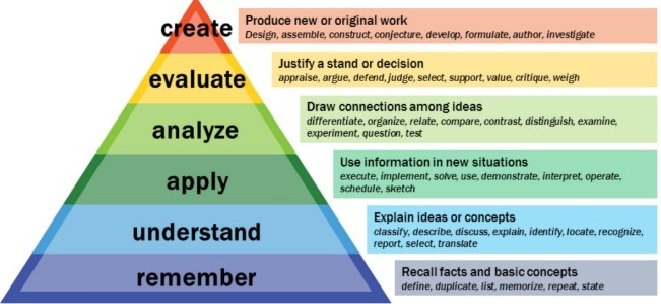Soggy crackers, cookie crumbs, and students breathlessly attempting to blow through straws… what greeted me as I entered our 6th grade science classroom sure looked like fun, but it was much more than that. Instead of receiving a lecture on the subject of erosion, students worked in pairs to determine the rates of erosion under various forces. Crackers and cookies stood in for types of rock as they weathered beneath the forces of student-generated wind and water. The excitement was palpable, and the learning was real.
Experiential learning, popularized by educational theorist David Kolb, is a philosophy that promotes “learning through reflection on doing” (Felicia, 2011). A generation earlier John Dewey championed hands-on learning, and millennia before him, Aristotle noted, “the things we have to learn before we can do them, we learn by doing them” (Chase Translation, 1911).

Yet it doesn’t take an educational philosopher to know that experiential learning is a powerfully effective way to reach the highest levels of educational achievement. We didn’t learn to ride a bike or learn to cook by simply hearing lectures on the subject; we learned by doing. As Bloom’s Taxonomy illustrates, rote learning focuses on the most basic of learning objectives, but is confined to these lowest levels, while the process of experiential learning reflects the upwards movement of learning towards the highest categories of educational attainment.
The Experiential Cycle
What innovative ways can we use to foster experiential learning? Kolb (1984) articulated this process as a cycle which calls for four actions: Experience, Reflection, Conceptualization, and Experimentation. We engage our students in hands-on experiences, then call on them to reflect on what they experienced, they then connect abstract concepts to that experience, and finally advance the cycle by experimenting with that idea. Let’s observe what that looks like in various disciplines.
Applying the Experiential Concept
Consider our 6th grade science students-turned-geologists. As they experimented with forces on their crackers, they re-created what happens in nature, evaluating which forces resulted in the most significant erosion. They made predictions, experimented with the process, and reflected on what they discovered – then repeated the process. This active participation in the learning process reflects the highest categories of academic achievement as identified by Bloom.
Steinbeck’s Of Mice and Men is a meaningful work that wrestles with challenging moral concepts. A literature teacher could present students with various moral and philosophical perspectives – is Lennie (spoiler alert!) responsible for killing Curley’s wife? Should mentally handicapped people be held liable for actions they don’t understand? Do intentions matter if someone commits a heinous crime but doesn’t intend to do evil? Is vigilante justice acceptable if the justice system doesn’t address a crime fairly? Our literature teacher decided, instead of lecturing on the subject, to put Lennie on trial. Each student became a character, either for the defense or the prosecution. They argued the case using evidence from the novel. Throughout the process they experienced the passions and struggles of the characters, and they reflected on what the tragedy meant in light of their newly-found perspectives. They conceptualized abstract ideas through concrete action, and they experimented with these concepts as they argued for their side through the trial. Our students didn’t learn about justice and its complexities; they experienced it, solidifying abstract concepts through active participation and reflection.
Consider the following examples of how I have seen experiential learning achieve similar results:
- Societal re-creation (social studies/history/civics): Create a fully operational society based on a political-economic model (capitalism, socialism, etc.). Appoint government officials, a press, business leaders, a financial system with its own currency, and give students roles to play within a socio-economic class structure. Students are given objectives and are mentored through the struggles of trying to accomplish their goals within the political-economic structure.
- Stock market game (math/economics): Students use real global market data to simulate financial investing and personal money management. Simulated funds are impacted by the volatility of real-world markets.
- Culture and language immersion (modern languages): At Alliance Academy International, our student body is made up of over 30 nationalities, yet we are widely regarded as the best English language school in the country. Why? In part, because of our experiential approach – a full immersion with our native speaking faculty in class, sports, drama, and travel to English language countries.
- Planting a garden (environmental science/botany): Students till the soil, choose plants, nurture growth, and harvest results. They experience failure and success as they interact with the natural world, engaging in the experiential cycle over and over. Bringing the produce to market introduces inter-disciplinary elements as well.
It doesn’t take complex activities like some of those listed above, however. Every day, in little ways, we can foster experiential learning. Students can create their own questions, teach their peers, use manipulatives, take risks – and participate in their own learning. So, whether it’s with crumbling cookies, outdoor activities, or global markets, learning through doing will pay dividends now and turn our students into lifelong learners.
References
Felicia, Patrick. (2011). Handbook of Research on Improving Learning and Motivation.
Kolb, David A. (1984). Experiential Learning: Experience as the Source of Learning and Development.
Nicomachean Ethics, Book 2. Chase translation (1911).
About the Author
Dr. Jim Cianca is the Executive Director at Alliance Academy International, an international Christian school in Quito, Ecuador with a 90 year history of providing a US style, English language education to both expats and Ecuadorians. Dr. Cianca has bachelor’s degree in English from Liberty University, a master’s in English Education from State University of NY at Buffalo, and a PhD in educational leadership from Columbia International University. Jim has been involved in high-quality private education in many roles, including as a head of school, an academic administrator, director of marketing & communications, an academic department chair, faculty member, and parent.









